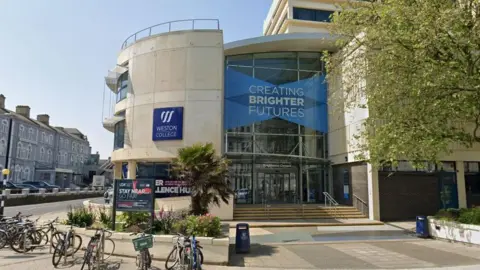Ex-head's £2.5m pay due to governance failure
 Google
GoogleMillions of pounds paid to a further education college principal were concealed due to "inadequate" arrangements for governance, government investigators have ruled.
Financial accounts published by independent Weston College in North Somerset show its then principal Sir Paul Phillips was paid £2.5m more than was properly declared between 2017 and 2023.
The sum included a £909,000 "retention payment", a remuneration package of more than £1.8m and "a variety of bonuses, benefits [and] allowances".
However, Sir Paul said the Department for Education (DfE) report contained "significant errors, misrepresentations and factual inaccuracies", which he had tried to have corrected. The DfE declined to comment further.
A financial notice urging managers to address "funding irregularities" was initially issued to the North Somerset college in May 2024.
According to the DfE, "the full board of governors did not explicitly ratify the majority" of the undisclosed payments, and failed to have proper accountability over public funds.
It followed an investigation by FE Week, which found Sir Paul was England's former highest-paid principal.
Sir Paul's son held senior finance roles at the college between 2019 and 2023, after which he became its chief operating officer.
The DfE report states "there is evidence" he "resisted" paying the retention payment, and "supported the finance team in their refusal to pay it".
In addition, it highlights the fact there was no "specific disclosure of this close family relationship" in the government's financial statements.
In a statement, Sir Paul said the payments made were "contractually due" to him over a period of two decades, not the five short years detailed in the report.
"The figure included recompense for pension errors and a retention package spanning 22 years, which was payable only on retirement," he explained.
"During my extensive tenure at the college, approaches from other organisations occurred and therefore the college introduced a retention scheme to retain me."
'Loyal servant'
Sir Paul said he had requested the retention payments be made annually but this was refused in writing by the then chair of governors.
He added the pension error correction was "insisted upon" by college auditors, and he was under the impression legal advice had been obtained.
"All of this information was provided to the FE commissioner and it is regrettable their report was not corrected prior to publication," he continued.
"As the FE commissioner's report clearly states, this is a 'governance issue' of which I played no part in other than being a loyal servant to the college for over 20 years."
In a letter to Tim Jackson, Weston College's interim chair of governors, DfE minister Baroness Smith of Malvern said she had accepted the recommendations made to the college by the FE commissioner.
These included clearly setting out the level of approval needed for "key decisions", such as senior staff pay, and a "personal relationships policy".
It also suggests a "skills audit" of the current board of governors, with a qualified accountant on the audit committee at all times.
Mr Jackson added: "Our focus now is on the robust and rigorous controls and governance, alongside a culture of trust, transparency, accountability and fairness in our decision making."
There has been no request from the DfE that any of the past remuneration paid to the former principal should be refunded.
However, there remains an ongoing investigation into "other aspects" of financial controls at Weston College, which are not detailed in the most recent report.
The DfE declined to comment further on the "active matter".
Follow BBC Bristol on Facebook, X and Instagram. Send your story ideas to us on email or via WhatsApp on 0800 313 4630.
